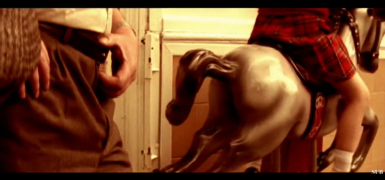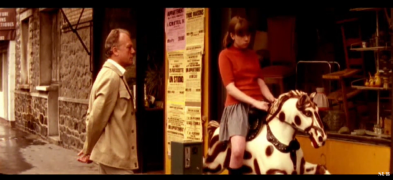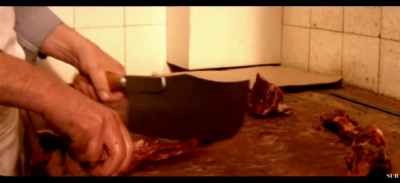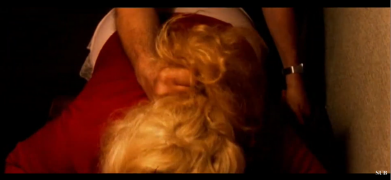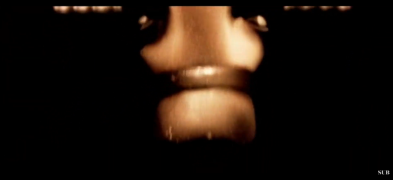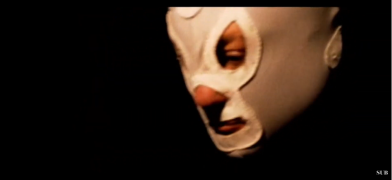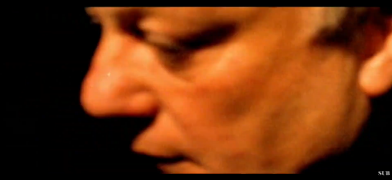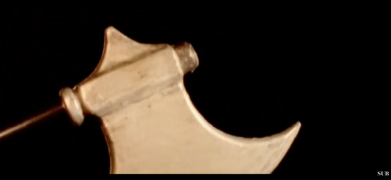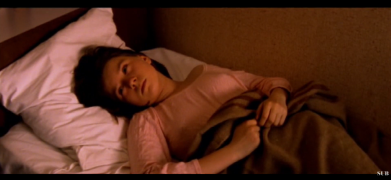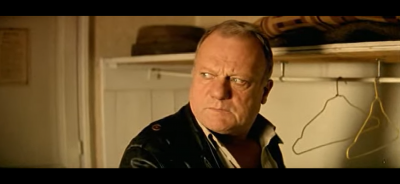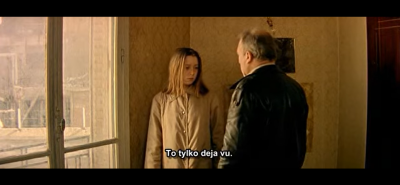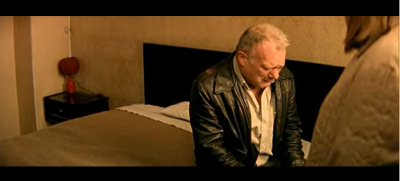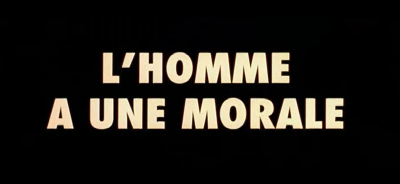You are reading a reconstruction.
Quick guide (IMPORTANT): please read our quick reading guide.
Spoiler note: we advocate a “spoilers don’t matter” stance. Read more about it.
Copyright note: we do NOT generally own the rights to the reconstructed content. Reproduction is made under the provisions of fair use for educational purposes.
For more info on reconstructions, we refer you to our manifesto or the online book.
I Stand Alone is the second part of a diptych. In the first part entitled Carne (french slang for horse meat), we meet the butcher, who raises alone his daughter Cynthia. The growth of his incestuous thoughts parallels the growth of his daughter into a young woman, and is associated to a <wooden horse>DEF for children.
❝ And in a few months, Cynthia became a young lady. Her body grew curves. It felt strange. ❞
❝ Et puis en quelques mois, Cynthia est devenue jeune fille. Elle a pris des formes. Ça m’a fait bizarre. ❞
While the butcher runs the slaughterhouse over the years, as established by short sequences of him hacking at meat cuts always with the same <downward>DEF motion,
Cynthia spends her time watching violence on TV where a masked character in a rather violent mood makes recurring appearances:

In this scene, the butcher has to literally spoon-feed the autistic Cynthia, while she watches TV with a masked character called “Carne” like the movie.
On the day Cynthia has her period for the first time, a boy tries to seduce her, appropriately next to the <wooden horse>. The butcher soon learns of it, and, believing she was raped, assaults an innocent worker by mistake. He does some time in prison and must sell his apartment and the slaughterhouse in exchange for freedom. Following his release, he finds a job at a café where he is seduced by the owner.
The owner, now pregnant, offers to sell the café and open a slaughterhouse in another town. This is presented as a <choice>DEF between her and Cynthia.
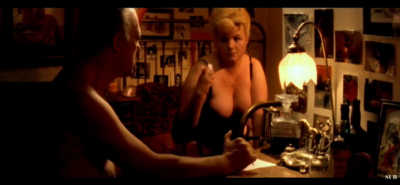
As a symbol of the
<choice>, the owner takes a letter to Cynthia and crumples it.
Despite his intense despise for her,
❝ I am her employee and there are only 2 things I cannot refuse her. The first is pounding her with my cock. The second is pounding her with my fist. ❞
❝ Je suis son employé et il n’y a que 2 choses que je ne peux pas lui refuser. La première c’est un coup de trique. La deuxième c’est un coup de poing. ❞
the butcher accepts the offer.
The film ends on a string of close-ups linking together a sex scene of the butcher taking the owner, the <wooden horse>, the masked character, the butcher, a knife pointed <downward>, and finally Cynthia:
This string of associations is fleshed out in the sequel, I Stand Alone, as a prophecy of <escalating>DEF violence leading up to Cynthia. I Stand Alone starts with the butcher and the owner moving to her mother’s apartment in the north of France. The preamble evokes the butcher’s life <choice> made in Carne:
❝ But the butcher, like every man, is a being of pure survival. He decides to forget about his past and his betrayal of his daughter and his love for her. ❞
❝ Mais le boucher, comme tout homme, est un être de pure survie. Il décide de mettre au placard son passé et d’oublier la trahison faite à sa fille ainsi qu’à son amour pour elle. ❞
However, the slaughterhouse project doesn’t pan out, and following a violent altercation with the owner, he flees, with just a few bucks and a gun stolen from the mother. He hitch-hikes his way back to Paris.
The butcher slowly sinks in bitterness and depression; he can’t find work in this time of economic crisis, his friends, poor as well, can’t help him much. He runs out of money, and begins to feel the effects of hunger.
Some encounters excite his homophobic and racist tendencies. He also profoundly resents the <venality>DEF of <society>DEF:
❝ What does this motherfucker think? That I’m some kind of leper? He should go to prison and find out what the real world’s made of. But rich people never go to jail. Maybe one or two every ten year, for show. Jail is for the poor. ❞
❝ Mais qu’est-ce qu’il croit, l’enculé? Que je suis pestiféré? Un bon stage en prison, ça lui apprendrait la réalité du monde à celui-là. Mais les riches ne vont presque jamais en prison, ou alors un tous les dix ans, pour l’exemple. La prison, c’est pour les pauvres. ❞
His diatribe emphasizes a <difference in scale>DEF between <society>’s morality and his own morality:
❝ France needs people like Robespierre. […] But nowadays, people are too cuddled to make a revolution. Now all that’s left is revenge for personal reasons. Yeah, like me, and it’ll be useful for everyone. If Robespierre was a national hero, so will I, on a small scale, by killing this fat gay pig who doesn’t want to give me a job because I made time in jail. ❞
❝ Ce sont des types comme Robespierre qui feraient du bien à la France aujourd’hui. […] Mais aujourd’hui les gens sont trop aidés pour faire la révolution. Tout ce qu’il peut y avoir, c’est des vengeances à titre personnel. Ça oui, comme la mienne, et ce sera utile pour l’ensemble. Si Robespierre c’est un grand héros national, moi aussi je le serai, à une toute petite échelle, en tuant ce gros porc de bourgeois homosexuel qui me refuse du travail parce que j’ai été en prison. ❞
For him, <venality> pervades even family:
❝ But all of it, it’s a lottery. And everything is determined at birth. Either you’re born poor, like the vast majority, and have to submit to the force of others, standing in line, but being constantly humiliated, sometimes you get violent. Or you’re born rich and you take care of your money. Pretending to love your wife, kids and friends… just like they pretend to love you. But as soon as your life or your house burns down, as soon as your dreams shatter, and you have nothing left to give, your so-called friends will all join together to crush you, in silence.
❞
❝ Mais tout ça c’est de la lotterie. Et tout se décide à ta naissance. Soit t’es né pauvre, comme la grande majorité et tu encaisses la puissance des autres, et tu marches au pas, mais à force d’être humilié tu deviens parfois violent. Soit t’es né riche, et alors tu fais gaffe à ton fric. Tu fais comme les autres, et tu fais semblant d’aimer ta femme, tes enfants, tes amis, comme eux font tous semblant de t’aimer. Mais le jour où ta vie ou ta maison prend feu, où tes rêves de bourgeois s’écroulent, et que tu n’as plus rien à leur donner, tes frères, tes soi-disant amis, ils se rejoignent tous pour t’écraser, en silence. ❞
His hatred and despair lead him to contemplate going out in terrorist fashion:
❝ After I’ve ended the other cretins, I should shoot myself. Nice suicide for the butcher. Because I’ll die anyway I might as well do whatever I want. No more punishment, no more crime. And if certain pleasures are forbidden, it’s just because of some assholes in a priest outfit or wearing a tie say so. But these strangers, I don’t like them. All they’ve done is crush me under their weight all my life. In the name of morality, all they’ve done is fuck me over. ❞
❝ Oui, après avoir buté les autres crétins, je devrais me flinguer. Un beau suicide pour le boucher. Et si je décide de mourir, je pourrai tout me permettre. Plus de place pour un châtiment, donc plus de crime. Et si certains plaisirs sont interdits, c’est parce que des connards en soutane ou en cravate en ont décidé ainsi. Mais moi ces inconnus je ne les aime pas. Ils n’ont fait que m’écraser de leur poids pendant toute ma vie. Au nom de leur morale, ils n’ont fait que m’enculer. ❞
But he decides to postpone his plans, as he has a moral debt towards Cynthia:
❝ But Cynthia? Do I have the right to leave her like this, with nothing? […] I am her father, and even if I brought her to this world by mistake, I must take responsibility. ❞
❝ Mais Cynthia? Est-ce que j’ai le droit de la laisser comme ça, sans rien? […] Je suis son père, et si je l’ai fait venir dans son monde même par erreur, je dois l’assumer. ❞
He uses a pretext to get her out of the orphanage. At the hotel, while she looks out the window, he gets the gun and <looks>DEF toward her. But an <ellipsis>DEF then implies they had sex:
❝ It’s done. What we needed to experience, we experienced it. But it wasn’t as beautiful as I believed. Now, it’s time to end this anguish, I have nothing to lose. ❞
❝ Ça y est, ce qu’on devait vivre on l’a vécu. Mais ce n’était pas aussi beau que ce que je croyais. Maintenant, il faut aller jusqu’au bout de cette angoisse, je n’ai plus rien à perdre. ❞
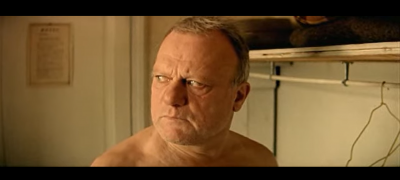
This shot of the butcher
<looking> toward Cynthia shows shows him naked from the waist up.
He then shoots at Cynthia, but she doesn’t die immediately, and agonizes instead. He begins to panic, and losing his sanity, looks at himself with disgust:
❝ Someone touched my daughter. He had no right. I will slaughter the asshole who did this. ❞
❝ Quelqu’un a touché à ma fille. Il avait pas le droit. L’enculé qui a fait ça je vais le massacrer. ❞
After a long descent toward madness where he fancies himself as the French President, he finally shoots his brains out. This is the culmination of an <escalation> of violence that was prophesized in Carne, going back to his <choice> to live with the café owner instead of Cynthia.
We then rewind back to the point in the story just before the murder. This is indicated by a <look> toward Cynthia with the clothes back.
The butcher seems to be back from having hallucinated the murder:
❝ But no, it’s me. It’s my head. I shouldn’t do this. I’m a good man and I should stay that way. ❞
❝ Mais non c’est moi. C’est ma tête. J’dois pas faire ça. Je suis un homme de bien et je dois le rester. ❞
As he approaches Cynthia, we expect him to have sex with his daughter:
❝ I know what will happen. I already lived this moment, yes I lived it, a thousand times. It’s as if everything was repeating over and over. ❞
❝ Je sais ce qui va arriver. J’ai déjà vécu ce moment, oui je l’ai vécu, mille fois. C’est comme si tout ça se répétait. ❞
But after looking at her, he turns away, sits on the bed and cries:
Cynthia then sits next to him, the first time in the entire diptych she actually seems to do something by herself, and he breaks down in her arms. The screen then cuts to a black screen with the following message:
❝ Moral. Man has morals. ❞
❝ Morale. L’homme a une morale. ❞
The mention of morality points out the fact that in both the murder scene (« Someone touched my daughter. He had no right ») and his <turnaround>DEF (« I shouldn’t do this. I’m a good man and I should stay that way ») away from the <escalation> of violence, the butcher was morally motivated, in his own way. The <difference in scale>, between society’s morality and his, is exposed in his final thoughts:
❝ I don’t care if they put me in jail. In any case, I will have this moment to remember. And the satifaction of having fulfilled my desire, not the desire of others. […] We’ll do it, and we’ll be happy. And this will be our secret. In any case, whether we do it or not, it won’t change humanity. But for you and for me, it will change everything. ❞
❝ Peu importe même si on me coffre. J’aurai au moins ce moment auquel m’accrocher. Et la satisfaction d’avoir réalisé mon désir, et pas celui de ceux qui m’entourent. […] On le fera, et on sera heureux. Et ce sera notre secret. De toute façon, qu’on le fasse ou pas, ça ne changera pas le cours de l’humanité. Et pour toi et pour moi ça changera tout. ❞
While it is implied he’s going to have sex with his daughter as he fondles her, the movie stops short of it happening, unlike in the murder narrative, where the murder takes place after the sex. And while the butcher admits in the murder narrative that « [sex] wasn’t as beautiful as I believed, » his emotional breakdown in the <turnaround> narrative shows this isn’t going to be like the « thousand times » he had sex, moving the focus away from pure sex and more toward love:
❝ People think they’re free? But freedom doesn’t exist. There are only laws that strangers made up for their own good, and that lock me into my misery. And among these laws, there’s one which says I shouldn’t love you, because you’re my daughter. And why? But this love, if they forbid it, it’s not because it’s evil, but because it’s too powerful. But in our case, it’s the only way I see. I love you, that’s all. ❞
❝ Les gens croient qu’ils sont libres? Mais la liberté ça n’existe pas. Il n’y a que des lois que des inconnus ont fabriqué pour leur bien, et qui moi me verrouillent dans mon malheur. Et parmi ces lois, il y en a une qui dit que je ne dois pas t’aimer, parce que tu es ma fille. Et pourquoi? Mais cet amour, on nous l’interdit, ce n’est sûrement pas parce que c’est mal, mais parce que c’est trop puissant. Mais dans notre cas, je ne vois que ça. Je t’aime, un point c’est tout. ❞
So the monologue ends on a certain nihilism (« I love you, that’s all »), as it only contradicts (rather than argues against) what he says elsewhere of the <venality> of all human relationships (« pretending to love your wife, kids and friends… just like they pretend to love you »).
